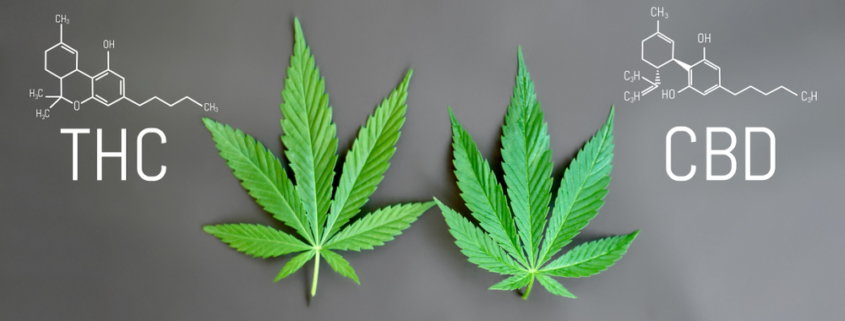Whether it be THC or CBD, the cannabis and hemp industries continue to create amazing new products with cannabinoids. While innovations are doubtlessly exciting, consumer education sometimes falls behind product development in cannabis and hemp. In particular, many people are still not aware of the difference between THC and CBD.
Importantly, being able to differentiate between THC vs. CBD is critical in distinguishing between marijuana and hemp. In the end, knowing these cannabinoids is also important in understanding the difference between illegal and legal products.
Cannabinoids have gained outstanding traction in the global market, and to continue this trajectory, consumer education is the next logical step in further legitimizing the hemp industry. As such, we thought it beneficial to discuss the nuances of THC vs. CBD in more detail.
What is THC?
THC is an abbreviation for the term “tetrahydrocannabinol.” THC is the most commonly known cannabinoid and it is the chemical responsible for getting people “high” when they consume marijuana. As such, much of the controversy in the modern cannabis and hemp industries has to do with THC.
All medical and adult-use marijuana markets in the United States today are built around THC products. Each U.S. state with legal cannabis has devised careful rules to regulate the production and sale of THC. Even more, THC levels in cannabis plants dictate their legal standing with the federal government.
When hemp was legalized in the 2018 Farm Bill, the FDA stipulated that any cannabis plant containing less than 0.3% THC is legally considered “hemp.” Today, the entire national hemp industry is built upon this ruling. Hemp breeders and farmers work tirelessly to produce quality hemp with low levels of THC and high levels of CBD.
What is CBD?
CBD is an abbreviation for the term “cannabidiol.” CBD was a little-known cannabinoid until the legalization of hemp in the 2018 Farm Bill pushed it into the global spotlight. Unlike THC, CBD does not produce any sort of “high” feeling – although people report that it offers a calming effect when consumed.
Aside from products made from the stalks of industrial hemp plants, CBD is the primary driving force behind the hemp industry we know today. While hemp is legal in the United States, the FDA has not officially sanctioned CBD as a legitimate medicine. As such, companies who label CBD products as medicines or supplements can still face serious legal consequences from the federal government.
CBD vs. THC: Key Differences
Cannabinoids are differentiated from other chemicals in the cannabis plant because they bind with cannabinoid receptors in the human body. While THC and CBD are both cannabinoids, they behave quite differently when consumed by people. The unique effects caused by these cannabinoids are the primary differentiating factors in their legal status.
Chemical Makeup
From terpenes to chlorophyll, the cannabis plant contains an incredible amount of compounds. The U.S. National Library of Medicine website reports that cannabis produces over 400 different chemicals. Of these, the average cannabis plant contains around 60 unique cannabinoids.
While THC and CBD have a similar chemical makeup, the way that atoms are organized in each molecule gives them unique properties when consumed by people.
Psychoactivity
The most defining characteristic of THC is the fact the cannabinoid is considered psychoactive. According to the National Cancer Institute website, a psychoactive compound is “A drug or other substance that affects how the brain works and causes changes in mood, awareness, thoughts, feelings, or behavior.”
One of the primary reasons that CBD has grown so popular is that it is non-psychoactive. Therefore, people can enjoy the benefits of CBD without concern for feeling inebriated.
Potential Medical Benefits
As neither THC or CBD has been officially approved by the FDA as medicine, our knowledge of their medical benefits comes from patient testimonies and early studies. Yet, as our understanding of cannabinoid-based medicines grows, we continuously learn about new potential applications.
- THC medical benefits: Cancer, HIV, AIDS, glaucoma, irritable bowel syndrome, Huntington’s disease, Parkinson’s disease, and more.
- CBD medical benefits: Seizures, sleep disorders, chronic pain, anxiety, depression, and more.
Side Effects
Depending on the subject in question, both THC and CBD can have side effects. These side effects vary with intensity from person to person and can be rather unpredictable.
Due to its psychoactive component, THC has far more reported side effects than CBD. Side effects of THC include drowsiness, edginess, red eyes, impaired memory, and lack of focus. CBD users report far fewer side effects than THC users. However, some people experience drowsiness, nausea, dry mouth, or gastrointestinal issues when using CBD.
Drug Testing
When it comes to drug testing, both THC and CBD present unique challenges. Because THC is federally illegal, many businesses and organizations drug test for the cannabinoid. Even if you live in a state where marijuana is legal, you still have to be concerned with THC showing up on a drug test.
CBD is not tested for in drug tests, nor is it scrutinized in most regions of the world today. However, as full-spectrum CBD products contain trace amounts of THC (less than the legal 0.3%), in rare cases they can cause you to fail a drug test.
Final Word: THC vs. CBD
Today, the hemp-derived CBD business is a global juggernaut. In the year 2020, the worldwide CBD market was valued at $2.8 billion. Yet, while CBD products are now readily available at retail and online stores worldwide, most consumers still don’t know much about cannabinoids. In order for hemp to progress, it’s critical we make an effort to educate people on the nuances of the THC vs. CBD discussion.
At High Grade Hemp Seed, we are honored to take part in building the new national hemp industry. Within this spectrum, we feel that teaching people about the benefits and drawbacks of THC vs. CBD is essential. As we learn more about cannabinoids, we can work to further refine dosage levels and match the appropriate compounds with the right ailments.
Please contact us to learn more about cannabinoid research and hemp CBD.



